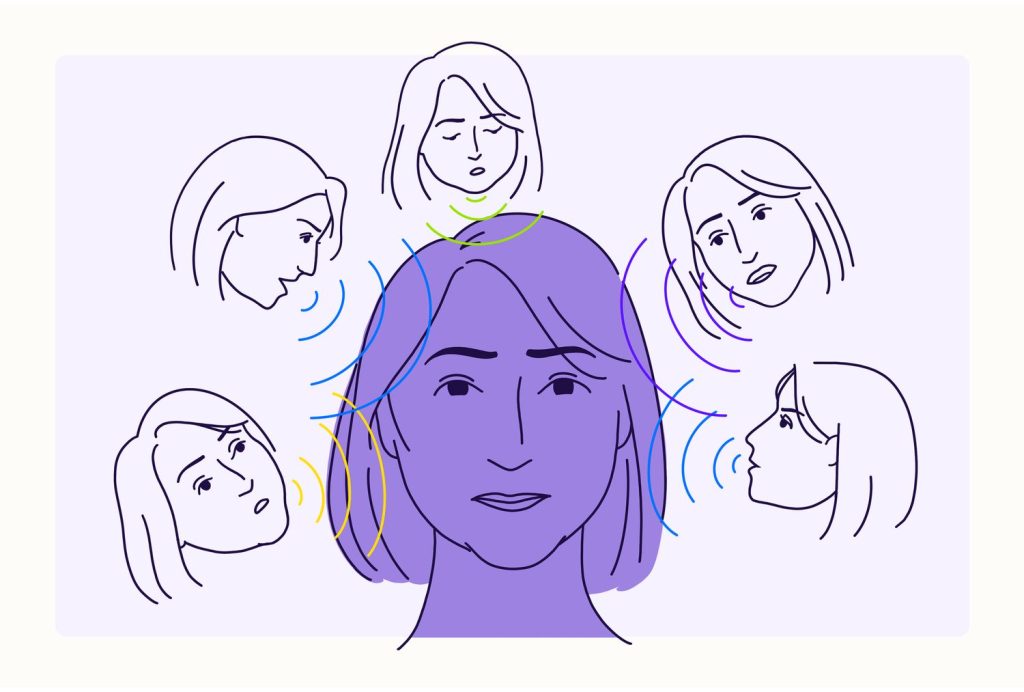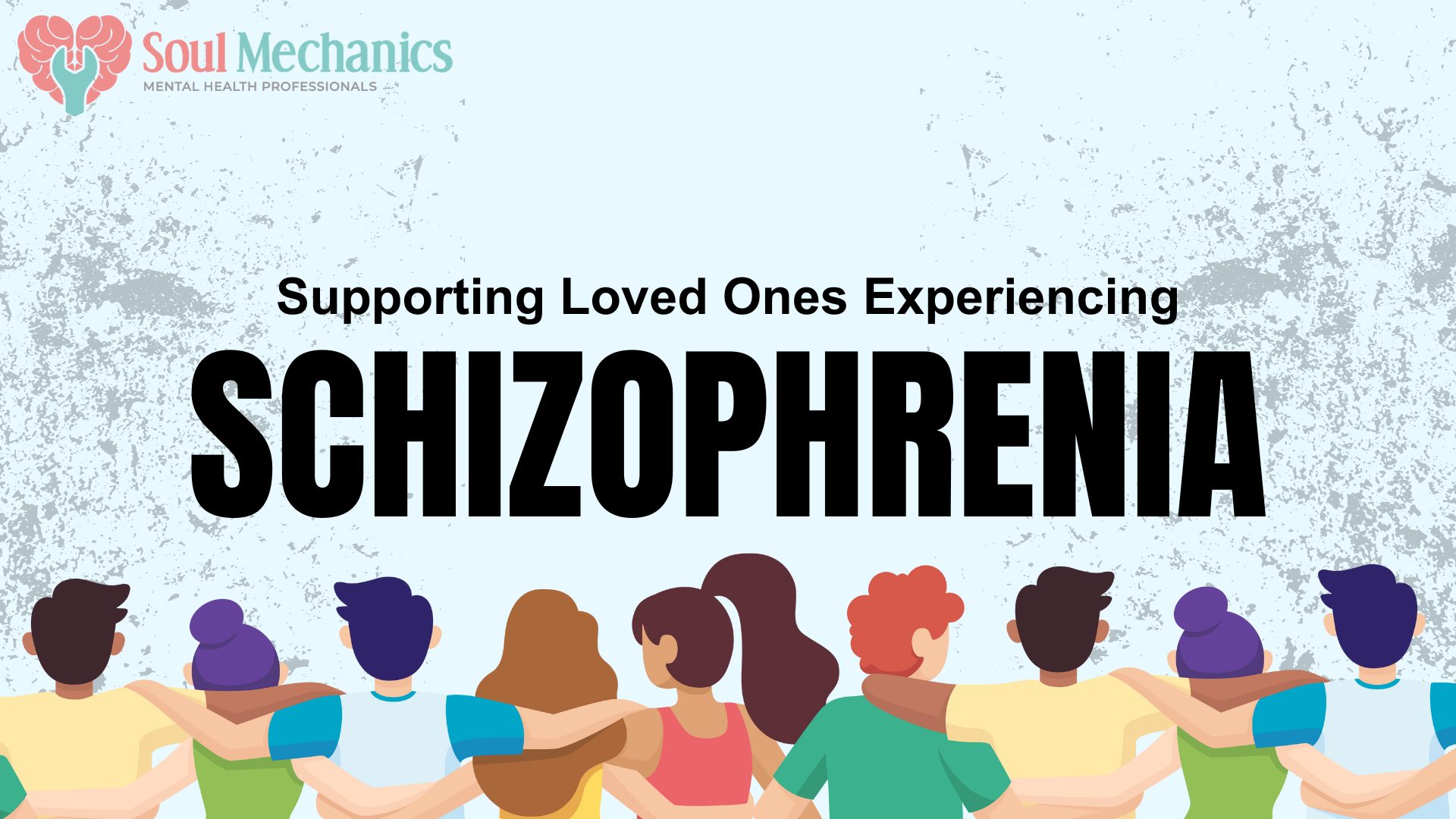How to Support a Loved One Experiencing Schizophrenia
How to Support a Loved One Experiencing Schizophrenia
What is Schizophrenia?
Schizophrenia is an often misunderstood mental health concern that significantly affects schizophrenic individuals and their families. It affects an individual’s emotions, thoughts, and perceptions towards self and the world around them. A lot of stigmas and fear surround this mental health condition, leading individuals with schizophrenia to often feel misunderstood and invalidated. These stigmas also often hinder them from going out to reach for needed support.
In this article, we will further delve deep into understanding schizophrenia, the common struggles, how to offer support and the pivotal role of therapy in assisting individuals with schizophrenia.

Understanding Schizophrenia
Schizophrenia features a wide range of symptoms that can be categorized into three categories, which are positive symptoms, negative symptoms, and cognitive symptoms.
1. Positive Symptoms.
Positive symptoms represent behaviours or experiences that are excess or added to an individual’s personality and are not present in other individuals. These positive symptoms include hallucinations (false sensory perceptions in terms of auditory, visual, olfactory, or tactile), delusions (false beliefs such as believing others are plotting against them, having an inflated sense of self-importance, and holding implausible beliefs), and experiencing disorganized thinking, speech or motor behaviours (repetitive gestures, lack or movements or response).
2. Negative Symptoms.
Negative symptoms represent the decrease or loss in normal abilities and functioning. Schizophrenic individuals may go through challenges in their motivation, expressing emotions, effective communication, initiating or maintaining focus on activities/tasks, and social withdrawal.
3. Cognitive Symptoms.
Cognitive symptoms often go unnoticed but can disrupt one’s daily functioning in terms of memory, attention, and problem-solving. It often impairs the ability to organize and plan for an individual with Schizophrenia.
4. Other Mental Health Concerns.
Schizophrenic adults are often subjected to the high risk of developing other mental health issues such as depression, anxiety and sleeping disturbances, as they struggle to manage their thoughts and emotions healthily.

Struggles of Experiencing Schizophrenia
Schizophrenia can be a very challenging experience to live with. Below are several common struggles that individuals with schizophrenia go through silently in their daily lives:
1. Social Isolation.
Individuals with schizophrenia often experience negative symptoms such as social withdrawal. This leads them to loneliness and isolation from their surrounding people and the world around them. They may also isolate themselves from relationships and other social activities due to their condition.
2. Relationships Challenges.
Individuals with schizophrenia also may unconsciously place their relationships under strain as they may struggle with the thoughts that no one fully understands them and their condition. Their loved ones also may feel overwhelmed and unsure of how to provide effective assistance.
3. Employment Struggles.
Many adults with schizophrenia may find it challenging to maintain stable employment due to the symptoms and relapse that they may experience from time to time. They are also frequently subjected towards workplace stigmas and misunderstandings due to their condition. Underemployment and frequent job changes are common among individuals with schizophrenia.
4. Societal Stigmas.
Society often surrounds individuals with mental health concerns with various stigmas and discrimination. These stigmas can hinder individuals with schizophrenia from accessing adequate opportunities and care due to their condition, leading them to feel misunderstood and isolated.
5. Disorganized Thinking.
Individuals with schizophrenia also struggle with managing their thoughts, leading them to have difficulty communicating coherently. These disorganized thoughts also often affect their logical thinking, reasoning and decision-making.
6. Medication Side Effects.
Oftentimes, the side effects of medications can be challenging and distressing for individuals with schizophrenia. This may lead them to have resistance to taking their medications or may develop a belief that medications are unnecessary for their recovery.

How to Offer Support to Loved One with Schizophrenia?
Offering support and a shoulder to lean on can be very valuable for our loved ones who are living with schizophrenia. Below are several ways you can offer your support to individuals experiencing schizophrenia:
1. Education & Self-Awareness.
It is important to educate ourselves about schizophrenia, its symptoms and its impacts when you have a loved one with schizophrenia. This helps us to understand their struggles better and reduces the possibility of us unconsciously invalidating their battles. Self-awareness of schizophrenia also helps us to offer more practical support for our loved ones with schizophrenia.
2. Encourage Therapy.
One of the crucial steps in supporting our loved ones experiencing schizophrenia is to suggest they seek therapy. A mental health practitioner can further assist them in developing a more specific therapy plan based on their needs and the intensity of their schizophrenia symptoms, leading towards more healthy symptom management and coping.
3. Emotional Support.
Include more effective communication skills such as empathy, active listening, and being mindful of your choice of words while communicating with loved ones with schizophrenia. This would make them feel heard and encourage them to express themselves more openly, leading to reduced conflicts and other misunderstandings in your relationship with them.
4. Encouraging Independence.
Encouraging independence by assisting them in taking small responsibilities and setting more realistic and achievable goals, by taking their condition into account. This provides them with a structure in their daily routine and reduces their worries about missing out on important tasks.
5. Medication Management.
Sometimes individuals with schizophrenia can be forgetful about their medications or may be reluctant to take their medications. During these days, show your support by listening to their concerns and assisting them with medication management. This would provide them with a feeling of being loved and cared for by their loved ones.
6. Activities Together.
Schizophrenic individuals encounter stress frequently. You can give your support by planning activities that you can do together with them to reduce their stress. This includes relaxation exercises, physical activity, creative expressions, etc. Activities together not only reduce their stress but also give them a deep sense of belonging.

How does Therapy help?
Oftentimes, individuals with schizophrenia go for medications to manage the intensity of their symptoms showing up. Along with medications, they need to attend therapy sessions to learn healthier coping skills and manage their issues effectively. Below are several benefits of therapy for individuals experiencing schizophrenia:
1. Social Skills.
Through therapy, individuals with schizophrenia can learn to improve their communication skills which enhances their interaction with others, especially their loved ones. This can reduce their social isolation, creating a sense of belonging and promoting improved relationships.
2. Enhancing Insights.
Oftentimes, many schizophrenic individuals are in lack of insights regarding their issues, triggers, and their impact on them and their loved ones. Through therapy, they can increase their understanding and awareness of their issues, which gradually promotes self-acceptance.
3. Coping Strategies/ Symptoms Management.
A therapist would work with schizophrenic individuals to understand their unhealthy coping skills and develop more practical and healthy coping skills to deal with their emotions and symptoms. Healthy coping leads towards healthier lifestyle management.
4. Crisis Intervention.
Relapses are something that may frequently occur for an individual with schizophrenia. With therapy, they can gradually develop their personalized crisis intervention plans to identify their potential relapses and work through them. This can prevent them from intensifying their symptoms and hospitalization.
5. Building Self-Esteem.
One’s self-confidence can be disrupted due to schizophrenia making them question themselves and have an unhealthy perception towards self. Therapy can navigate these individuals towards developing a more positive self-image, leading to an improved sense of self-worth and empowerment.
6. Employment Support.
Therapy also helps schizophrenic individuals maintain their employment by working through managing their symptoms and gives them the much-needed encouragement to find jobs by working on their thoughts and fears.

Conclusion
In short, schizophrenia is a challenging mental health concern that needs equal empathy, understanding, and support from both loved ones and society for individuals with schizophrenia to live a more inclusive life with others. Your support, no matter how small it is, can be very valuable for individuals with schizophrenia. It instils hope deep within them. Let us break the stigmas that surround schizophrenia and view them as unique individuals with unique concerns just like every one of us. The first step of this journey always begins with their loved ones.
In addition, therapy can be a vital component in their healing as it equips them with adequate tools to manage their symptoms, leading towards a more improved quality of life. With the right support and treatment, schizophrenic individuals can lead a more successful and fulfilling life.
“We discover more about life by learning to see life from the lenses of our loved ones with Schizophrenia.”
If you enjoyed reading this, why not broaden the horizon of knowledge by learning about "Disenfranchised Grief"?
You can read the blog here.
For more content related to mental health do follow us on our official Instagram.

